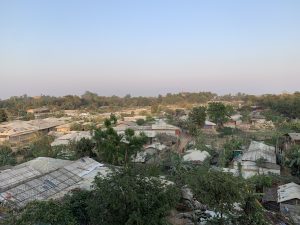The recent decision by the United States to freeze foreign aid has significantly impacted the humanitarian situation in Bangladesh, particularly affecting the Rohingya refugees in Cox’s Bazar. The Rohingya, a Muslim ethnic minority group from Myanmar, have sought refuge in Bangladesh since 2017, fleeing violent persecution in their home country.
Cox’s Bazar hosts the world’s largest refugee settlement, where over a million Rohingya refugees live in overcrowded camps. Historically, the United States has been a key donor in supporting the Rohingya refugee response, providing critical funding for essential services such as food, healthcare, education, and clean water. However, the recent aid freeze has left many vital programs underfunded, further increasing the vulnerability of the refugee population.
This decision is particularly concerning as the Rohingya refugees are already facing significant challenges due to a reduction in international support. Bangladesh has been bearing the financial burden of the refugee crisis without sufficient assistance from the international community. The freeze in U.S. aid has forced many organizations that rely on American funding to cease operations, leading to the closure of key healthcare facilities and the loss of jobs for locals and Rohingya. Some of those organizations still operating are struggling to provide the same level of assistance, focusing primarily on emergency cases, but are unable to deliver the comprehensive support that is urgently needed.
Furthermore, the U.S. decision undermines broader global efforts to address the root causes of the Rohingya crisis, including advocating for the safe, voluntary, and dignified return of refugees to Myanmar – a process that remains stalled amid ongoing violence and instability in the region.
The impact of the aid freeze is most acutely felt by the most vulnerable refugees – particularly women, children, and the elderly – who depend heavily on this support. Many families are now facing severe economic hardship with limited opportunities for self-sufficiency and livelihood. The lack of adequate assistance increases the risk of exploitation, human trafficking, and gender-based violence.
The U.S. aid freeze has worsened the already precarious conditions of the Rohingya refugees, leaving them in a state of heightened vulnerability and loss of hope. As the international community seeks to address this ongoing crisis, it is critical for donors, including the United States, to reconsider their aid decisions and ensure that the Rohingya refugees continue to receive the essential support they need to survive and rebuild their lives.
As the U.S.-funded organizations are unable to provide the same services as before, the Rohingya refugees in the camp have expressed their deep concern over this freeze. They deeply rely on this assistance for their survival and well-being, and urge the international community to intervene and restore hope for a more secure and dignified future.

































